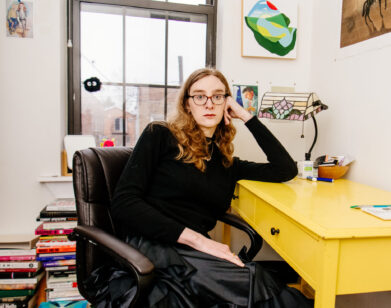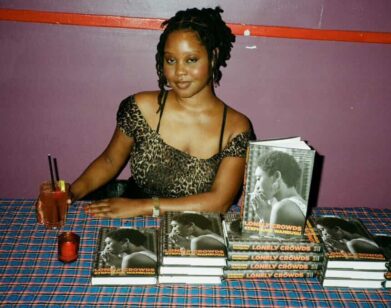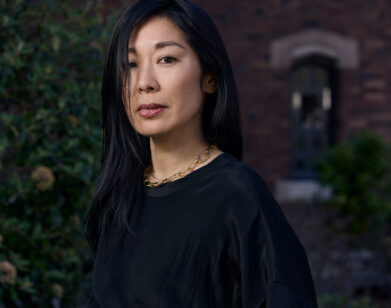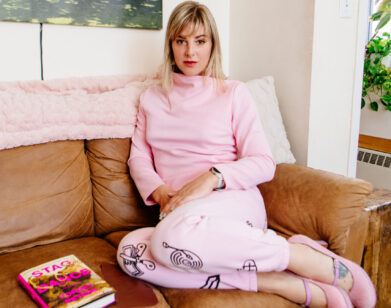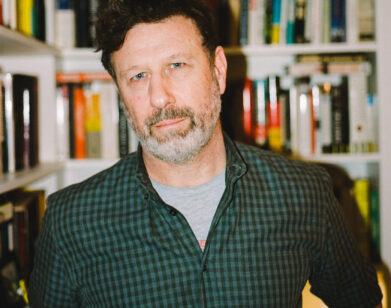FICTION
Emma Cline Tells Louise Bonnet About Her Eerie Novel The Guest
I was thinking that Emma Cline’s writing reminded me of Cat Power’s cover of “Satisfaction,” where she removed the parts that at first glance would seem like the important ones, the bits that make the song pop. Of course, being left only with the undercurrent, the meaning becomes at the same time so clear and so alien that it’s thrilling. Our friendship is also a bit like this. She lets me become comfortable and, after I have said everything there is to say about the return of the short Ugg boot, I remember that she was just awarded an O.Henry Prize and I am surprised to realize that I always feel free to be as stupid or as sharp as I want to be with her, and that she will welcome both.
Her new novel The Guest displays exactly these seemingly separate facets: Emma’s razor-sharp power of observation and an ability to synthesize feelings and emotions mixed with a deep well of empathy and understanding that makes her a unique force. She is willing to let the winding undercurrent of life and friendship be what matters, and so it is thrilling to know and read her. A few weeks ago, before her newest novel hits shelves, Emma Cline and I got together and sat on her couch to talk about it, and our love for books featuring deranged characters.—LOUISE BONNET
———
EMMA CLINE: Thank you for talking with me. I guess we should say that we are on my couch. which we are often on, talking, drinking wine, and I’m always very happy to have you.
LOUISE BONNET: And I always love being here. So we both like true crime.
CLINE: Yes. We were saying that is something we should talk about because it’s almost like how we became friends, going back and forth with true crime recommendations.
BONNET: I feel like that’s how we became friends, yeah.
CLINE: It was a big early topic of conversation. I feel like there was one book on the Hillside Strangler. I can’t really remember what it was called…
BONNET: I think we both agreed on why it was so very bad.
CLINE: It wasn’t as good as we wanted it to be.
BONNET: It was really offensive, which if you’re talking about true crime, is a weird thing to say.
CLINE: I feel like the book that really hit it out of the park for both of us was Alive.
BONNET: Yes, because it’s so inspiring and makes you believe in life.
CLINE: (Laughs) Really, you found it inspiring? It’s so funny that we could have two different interpretations. Mine was, in that situation, I would absolutely crumble, like if I was in an airplane that crashed, you don’t have any food, you’re in the Andes Mountains, all that stuff, I think I would just immediately want to exit out of being alive. But you were like, “No, I would triumph.”
BONNET: No, ‘cause you were like, “I’ll be the one person who’s complaining.”
CLINE: Yes. It’s a very good litmus test for which one of the rugby team are you. Like, are you the one who’s inspiring everyone and keeping up morale or are you the one that’s loafing around, building your own sunglasses out of the airplane window material?
BONNET: Well, you see? That was pretty useful.
CLINE: But he was only making sunglasses for himself, not for anyone else, and I thought, unfortunately, that’s who I would be. Complaining, making sunglasses, not being inspiring or helping anyone else.
BONNET: I know I would definitely not be inspiring anyone but I also wouldn’t eat someone’s mom, probably.
CLINE: You don’t think you would?
BONNET: Maybe I would. That was an amazing book. Did you Audible it? I think we both Audibled.
CLINE: No. This is one of the sad things for writers where painters really get the better end of the deal, because you can listen to audiobooks while you work.
BONNET: Yeah, it’s true.
CLINE: I don’t listen to audiobooks at all.
BONNET: Because you can’t, you can’t.
CLINE: I can imagine the audiobook version might be good. I feel like it’s one of those books that’s always at somebody’s parents’ house or vacation house, like the pulpy kind of paper you can put a fingernail through easily, with the pictures in the middle.
BONNET: You do miss that with Audible. I missed the pictures, But the guy reading did not put any emotion in it. There was no intensity, which is what you want. I was wondering why we both like that so much. I know I love granular minutia about word process. I’m really interested in flat instructions and going from one point to the next.
CLINE: If I had to think of how I see it reflected in both of our work, I feel like it’s almost like an extreme. We’re both interested in extremes and body horror, the weirdness of inhabiting a body and the idea of getting to a point where you could do that to another human being. What does that look like? I think I’m interested in what’s the consciousness [of that], how are you going to get behind the eyes of somebody who’s putting themselves in that place?
BONNET: I was wondering how you did that. Because you clearly are bringing someone along a path to make them do something, but it’s obviously well done, so there must be a path that you’re carving for that to happen.
CLINE: Yeah. I guess I was thinking, with this book especially, about The Talented Mr. Ripley. Have you ever read the book?
BONNET: Uh huh, yeah.
CLINE: The movie is so fun. Can you think of a more fun, beautiful movie?
BONNET: Which is distracting, in a way, because the book is just so dark.
CLINE: Yeah, yeah. I feel like Philip Seymour Hoffman in the movie whenever I get a bad sunburn, unfortunately.
BONNET: (Laughs).
CLINE: But what’s so weird about that book and Patricia Highsmith and why she does this. Like, why do you want him to get away with the murders? Why are you suddenly so on board? How does she kind of bring you over to his side? That’s interesting to me, but also thinking about how humans behave and what they are thinking when they are doing stuff that’s so extreme and so outside of our moral code.
BONNET: See, you’re thinking about all that stuff but you’re not putting it in, really. I guess it’s like an actor, when they do a whole backstory about a character but you don’t know it.
CLINE: Yeah. You and I have both talked about that before, [how] after you’ve done all this work, you put up a show with your paintings, having to talk about it afterwards and account for this process that’s actually very mysterious and not something you can totally pull apart and explain.
BONNET: To yourself, even.
CLINE: Yeah, yeah, yeah. But there’s a demand to kind of create a narrative about why you did things, about why you were making certain choices. But at least for me, it does feel so subconscious, below my ability to actually recognize it. Do you feel the same?
BONNET: Yes, exactly. I think the trick is to allow yourself to do that and to realize that even though it seems you are making up some things, afterward you realize you really knew what you were doing.
CLINE: Yeah, I feel there’s something comforting about seeing only after the fact that there are certain concerns that you return to, or certain obsessions, dynamics, something baked into your lens on the world.
BONNET: Yeah, because this book is basically a very slow horror movie. Like, if you remove all of the tropes from them, I would say that horror movies are actually like books. You know something terrible is going to happen and how it’s leading there and then the clown comes out and you’re like “Ehh, whatever.” And I feel like that’s what you do.
CLINE: Aw that’s nice. I was remembering that you like horror movies.
BONNET: Oh, yes. I remember you hate them! You can’t stand them!
CLINE: That’s right.
BONNET: I remember you saying that you can read them but you can’t watch them.
CLINE: Yeah, it’s much worse to watch it. Sometimes, if there’s a scary movie, I’ll read the Wikipedia article about it before I watch it because I just want to know what happens so then it’s not so frightening.
BONNET: I was wondering, also, because you’re one of the most empathetic people I know
CLINE: (Laughs) Oh my god.
BONNET: To be able to write about somebody, you have to empathize with them. I always thought that was funny, that you could empathize with someone and they go in such a terrible direction, and you do. But it must take a toll?
CLINE: I guess I don’t feel that it takes a toll, that’s not how I experience it. I can kind of understand, in any situation, how that could be possible. I feel like as soon as you start being like, “I’m like this” or “I’m a good person” or “I’m X” and “you’re Y” or, “I would never do that because I’m like this,” the stories you tell yourself about who are you are are actually pretty false. We are so dependent on circumstance. It’s so much easier and convenient to ascribe this morality, but I kind of accept that we all have the capacity for a lot of weird stuff.
BONNET: Stuff that you didn’t even know you had a link with.
CLINE: Maybe that’s what I like about true crime, just seeing the circumstances that might give rise to a situation you think is beyond imagining. Sometimes, in my fiction, I think I’m trying to fill in those blanks.
BONNET: Yes, like the weird detail that sends you over the edge. I was watching this documentary about Paul McCartney and he was explaining that he wrote songs basically in shapes. I can’t remember exactly what he said, but I think he said something like, “Well this is a very pointy song” or “I thought this had a nice square.” I thought that was so interesting.
CLINE: Like synesthesia, almost.
BONNET: I was wondering if you do that? Like, do you see a structure? Or do you think, “Okay, here is a book whose pattern is going to be like this.”
CLINE: I know what you mean. I think a lot of it is, “Is the tone right?” What is the book’s emotional tone? It’s like the feeling when you go out in an outfit that you thought looked good at home and then it’s just horrible once you’re in the world. Certain things are just so wrong and it just feels wrong on a deep level. And I guess I do see it, not in terms of shapes maybe, but there’s a tension that I’m after. And it’s a balance. “Okay, does this scene maintain the tension? Is it draining? Is it going slack, suddenly? Do I need to plug something else in that will activate it in a different way?” You are sensing your way towards a certain productive tension. Is that how you feel making a painting?
BONNET: I’m not really sure. I think, unlike you, I don’t really know what it will end up like. I think you do know, so then you can work the tensions in between.
CLINE: Totally.
BONNET: I don’t really know what’s going to happen. I know if I get bored, or if I feel like it’s too obvious, which is boring, that’s when I need to change it. I think I’ve done it often enough that I can pinpoint at what moment I get bored.
CLINE: That’s so nice. I find that too, when I’m re-reading stuff before I start working the next day, there’s a tightening where I don’t want to quite read it. There’s some little private embarrassment. That’s when I know, “Okay, this scene really needs work, or something isn’t working about it.” With this book, I knew where I wanted it to end. It’s very loosely inspired by The Swimmer, this John Cheever short story that ends in such a bizarre desperate, haunting way, to me that’s like a horror story, a story where you’re estranged from your own life, everyone you love is gone, you can’t account for how you got so far into the woods. There’s something just so devastating about it. I knew the book should end there, but it’s filling in what happens in between, like, “Does this situation activate the main character or not? Is it doing enough?”
BONNET: It makes absolute sense. The whole book, sometimes you have hope and then the hope just gets sidetracked. It’s really John Cheever. It’s one of those few books where I have images that I made in my own head, where I feel like I’ve seen a movie. I’ve made a perfect image in my head.
CLINE: Totally! That’s what’s so weird about that story, The Swimmer, that’s so important to me. Even just re-reading it, I found that it was actually totally different. I had such a strong image of it that wasn’t actually the story itself. Like, stories that create this after-image in you, maybe you don’t want to re-read it because you almost prefer this image that you made in your own mind. I feel that way about that story.
BONNET: With Patricia Highsmith, I feel that too. There’s no mercy. There’s no, “Oh, well. Actually it’s fine.” There’s a specific sour, in a good way.
CLINE: I feel like your paintings are not comfortable.
BONNET: Yeah.
CLINE: But it’s so nice. I really love the feeling. When I look at one of your paintings, I become very aware of the outlines of my own body and the sense of separation between my own body and the outside world. There’s an uncomfortable, prickly feeling where you suddenly feel like the boundaries could be penetrated in this way that’s nerve-wracking. There is this pinprick of body anxiety.
BONNET: Yeah, I start with unarticulated feelings like that. But it’s sometimes very, very vague.
CLINE: I’m using the word “characters,” but maybe that’s not the right word. But to me, the characters in your paintings, there is something very female about them, that particular performance of female-ness, contrasted with the reality of the body, which I think I’m naturally interested in. And I do feel like there’s a real affinity in both of our works. I see that echo. There is something monstrous about what we demand of women in terms of the outward performance of their gender and the private experience of the body that’s often more harrowing.
BONNET: “Performance” is such a good word, because it’s true. It is. You’re being asked to perform a certain way and you buy into it, obviously. I buy into it. I really admire people who don’t, but it’s true that it’s so strange how we are asked to…
CLINE: Well, kind of deny the reality of the body. And I think it’s so great, your paintings really insist on the reality, like piss, blood, bodily fluids–
BONNET: Someone will eat your butt cheek.
CLINE: If your plane crashes, your butt cheek will be eaten.
BONNET: What I like is you put on this nice pink underwear and, in the end, they will push it aside, because they will eat your butt.
CLINE: (Laughs)
BONNET: That is the best, really.
CLINE: Totally. I know with The Guest and the main character, it was having her have this stye in her eye, this thing where the body wins out in the end. The brute reality of the body is insistent. Even if you are going to be caught up in all the human business of whatever social maneuverings, the body is this weird time clock that doesn’t go away and doesn’t operate by those rules.
BONNET: It won’t bend.
CLINE: I feel like we should leave it there, with someone eating your ass in a plane crash.
BONNET: Don’t you feel like you would be totally fine if that happened?
CLINE: Are you saying you would be fine if you were the person that was eaten or if you ate somebody?
BONNET: Well, I’m happy to be eaten if there is nobody else.
CLINE: Yeah. We’re totally clear about everything.
BONNET: Yeah.


